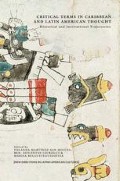Abstract
How do we translate key critical terms from English into Spanish? What kinds of “adjustments” do we make when considering a critical or a theoretical idea? In other words, if a theory emerges from a particular historical, literary, cultural, or visual text, what kinds of changes does it undergo when we apply it elsewhere, in a different semantic field? These changes often go unregistered, and we run the risk of imposing other theoretical concerns rather than illuminating new texts. This critical risk operates at many levels—social, cultural, political, and pedagogical, to name a few—in which theory from elsewhere arrives at a new site (as a new sight) and is used to explain other works and events.
Access this chapter
Tax calculation will be finalised at checkout
Purchases are for personal use only
Preview
Unable to display preview. Download preview PDF.
Works Cited and Further Reading
Allatson, Paul. 2006. Key Terms in Latino/a Cultural and Literary Studies. Wiley-Blackwell.
Anzaldúa, Gloria. 1987. Borderland/La Frontera. San Francisco: Aunt Lute Books.
Belausteguigoitia, Marisa. 2009. Güeras y prietas: género y raza en la construcción de mundos nuevos. Mexico, DF: Universidad Nacional Autónoma de México, Programa de Estudios del Género.
—. 2013a. “Strategies for a Transnational Reading of Border Writers. Gloria Anzaldúa, Rosario Castellanos and Subcomandante Marcos: Pairing a Triangle.” In Translocalities/Translocalidades: Feminist politics of Translation in Latin/a Americas, edited by Sonia E. Alvarez and Claudia de Lima Costa, 46–76. Durham, NC: Duke University Press.
—. 2013b. “Chicana/o Studies and Latina/o Studies in México.” In Routledge Companion Dictionary, 95–106. New York: Routledge.
Bennett, Tony, Lawrence Grossberg, and Meaghan Morris. 2005. New Keywords: A Revised Vocabulary of Culture and Society. Wiley-Blackwell.
Bernabé, Jean, Patrick Chamoiseau, and Raphaël Confiant. 1990. Éloge de la Créolité/In Praise of Creoleness,” translated by Mohamed B. Taleb Khyar. Baltimore: Johns Hopkins University.
Bolívar, Reinaldo. 2003. “EsLa estrategia transnacional en los países desarrollados y en vías de desarrollo.” Aldea Mundo 7.14 (November–April): 26–35. http://www.redalyc.org/articulo.oa?id=54371404 (Accessed on December 27, 2014).
Burgett, Bruce, and Glenn Hendler. 2007. Keywords for American Cultural Studies. New York: New York University Press.
Buscaglia Salgado, José. 2003. Undoing Empire: Race and Nation in the Mulatto Caribbean. Minneapolis: University of Minnesota Press.
Cornejo-Polar, Antonio. 1994. Escribir en el aire. Ensayo sobre la heterogeneidad cultural en las literaturas andinas. Lima: Editorial Horizonte.
—. 2002. “Mestizaje e hibridez: Los riesgos de las matáforas. Apuntes.” Revista iberoamericana 68.200 (July–September): 867–870.
Enwezor, Okwui, et al. 2003. Creolité and Creolization. New York: Documenta 11_Platform 3.
Haraway, Donna. 1988. “Situated Knowledges: The Science Question in Feminism and the Privilege of Partial Perspective.” Feminist Studies 14.3 (Autumn): 575–599.
hooks, bell. 1994. Teaching to Transgress. Education as the Practice of Freedom. New York: Routledge.
Martínez-San Miguel, Yolanda. 2014. Coloniality of Diasporas: Rethinking Intra-Colonial Migrations in a Pan-Caribbean Context. New York: Palgrave.
McKee, Irwin, and Mónica Szurmuk. 2012. Dictionary of Latin American Cultural Studies. Gainesville: University Press of Florida.
Mignolo, Walter. 2000. Local Histories/Global Designs. Princeton, NJ: Princeton University Press.
—. 2005. The Idea of Latin America. Malden, MA; Oxford: Blackwell.
Mohanty, Chandra. 2003. Feminism without Borders. Decolonizing Theory, Practicing Solidarity. Durham, NC: Duke University Press.
Newton, Melanie. 2013. “Returns to a Native Land: Indigeneity and Decolonization in the Anglophone Caribbean.” Small Axe 41 (July): 108–122. doi 10.1215/07990537-2323346.
Poblete, Juan, ed. 2003. Critical Latin American and Latino Studies. Minneapolis: University of Minnesota Press.
Quijano, Anibal. 2000. “Coloniality of Power, Eurocentrism, and Latin America.” Nepantla: Views from South 1.3: 573–580.
Revista de Crítica Literaria Latinoamericana. 1996. Special dossier: “Las poéticas coloniales y el origen del pensamiento teórico-crítico en Hispanoamérica.” Nos. 43–44.
Said, Edward. 1983. “Traveling Theory.” In The World, the Text and the Critic, 226–247. Cambridge: Harvard University Press.
—. 2000. “Traveling Theory Reconsidered.” In Reflections on Exile and Other Essays, 436–452. Cambridge: Harvard University Press.
Schwartz, Roberto. 1973. “As ideias fora do lugar.” Estudos Cebrap (Centro Brasileiro de análise e planejamiento) 3: 151–161. http://www.cebrap.org.br/v2/files/upload/biblioteca_virtual/estudos_cebrap_3_as_ideias_fora_do_lugar.pdf (Accessed on December 27, 2014).
—. 1980. “Misplaced Ideas: Literature and Society in Late Nineteenth-Century Brazil.” Comparative Civilizations Review 5: 33–51.
Sifuentes-Jáuregui, Ben. 2014. The Avowal of Difference: Queer Latino American Narratives. Albany: SUNY Press.
Szurmuk, Mónica, and Robert McKee Irwin. 2009. Diccionario de estudios culturales latinaomericanos. Mexico: Siglo XXI.
Wallerstein, Immanuel. 1974–89. The Modern World-System. 3 vols. San Diego: Academic Press.
Weinberg, Liliana. 2004. Literatura Latinoamericana. Descolonizar la imaginación. México: CIALC/UNAM (Centro Coordinador y Difusor de Estudios Latinoamericanos).
Williams, Raymond. 1985. Keywords: A Vocabulary of Culture and Society. Oxford University Press.
Wynter, Sylvia. 1970. “Jonkonnu in Jamaica: Towards the Interpretation of Folk Dance as a Cultural Process.” Jamaica Journal 4.2: 34–48.
Editor information
Copyright information
© 2016 Yolanda Martínez-San Miguel, Ben. Sifuentes-Jáuregui and Marisa Belausteguigoitia
About this chapter
Cite this chapter
Martínez-San Miguel, Y., Sifuentes-Jáuregui, B., Belausteguigoitia, M. (2016). Introduction. In: Martínez-San Miguel, Y., Sifuentes-Jáuregui, B., Belausteguigoitia, M. (eds) Critical Terms in Caribbean and Latin American Thought. New Directions in Latino American Cultures. Palgrave Macmillan, New York. https://doi.org/10.1057/9781137547903_1
Download citation
DOI: https://doi.org/10.1057/9781137547903_1
Publisher Name: Palgrave Macmillan, New York
Print ISBN: 978-1-349-55764-6
Online ISBN: 978-1-137-54790-3
eBook Packages: Literature, Cultural and Media StudiesLiterature, Cultural and Media Studies (R0)

